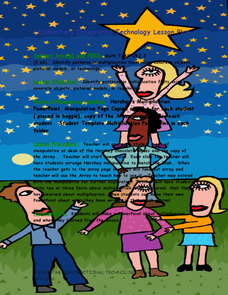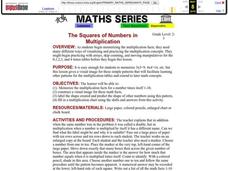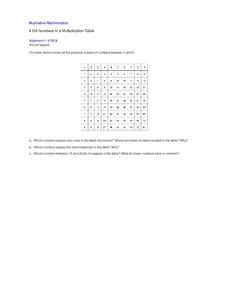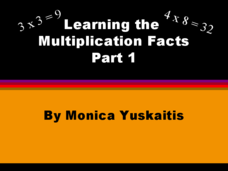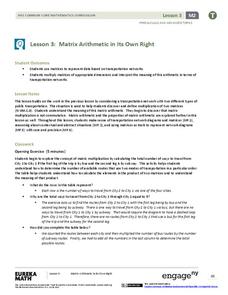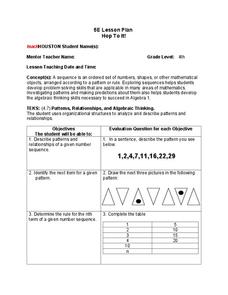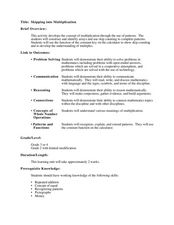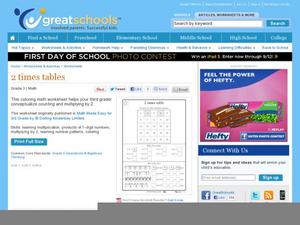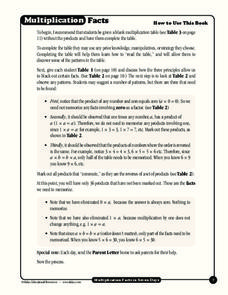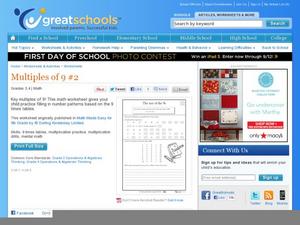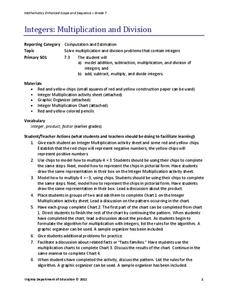Curated OER
Patterns in the Multiplication Table
Explore patterns in the multiplication table in order to deepen your third graders' understanding of this essential skill. Implement this activity as a whole-class lesson plan, allowing students to work in pairs or small groups to...
Curated OER
Symmetry of the Addition Table
Help your class discover the commutative property of addition with this exploration of the addition table. By folding and coloring the table, a symmetry is found that directs students to an understanding of this crucial mathematical...
Curated OER
Patterns In Multiplication
In this patterns in multiplication worksheet, students, working with a partner, problem solve and calculate the answers to fifteen word problems or mathematical equations involving patterns in multiplication.
K-5 Math Teaching Resources
Multiplication Chart
This is not your run-of-the-mill multiplication chart. Going beyond the standard 12 x 12 limit, this resource includes multiplication facts up through 12 x 20, making it great for supporting children as they continue working toward being...
Curated OER
Introducing Multiplication
Learners will look at repeating addition examples and view how they can be written as multiplication. They use manipulatives to complete a repeating addition lesson and show it on graph paper. They also chart what they have found and...
Curated OER
The Squares of Numbers in Multiplication
Review multiplication facts and concepts! This clear, and easy to follow lesson will help your class to understand multiplication by using arrays and repeated addition. There are strategies to help with memorization and manipulative...
Illustrative Mathematics
Numbers in a Multiplication Table
Identifying patterns is a crucial skill for all mathematicians, young and old. Explore the multiplication table with your class, using patterns and symmetry to teach about square numbers, prime numbers, and the commutative and identity...
Curated OER
Learning the Multiplication Facts: Part 1
When students explore mathematics through patterns they will build a strong number sense and creative analysis skills. This presentation shows students that 0's, 1's, 2's, 5's, 6's, and 9's all have patterns. Tip: Before revealing each...
Santa Barbara City College
How to Make a Multiplication Table
Teach children how to make a multiplication table, and they'll be multiplying for life. Following this series of steps, young mathematicians learn to use patterns and the relationships between numbers to create their very own...
Curated OER
Multiplication
Students practice their multiplication facts by reinforcement and repetition. Students write facts in their math journals, and use labeled soccer ball and deck of cards to practice multiplying by "number of the day." Play continues until...
EngageNY
Matrix Arithmetic in Its Own Right
Matrix multiplication can seem random to pupils. Here's a instructional activity that uses a real-life example situation to reinforce the purpose of matrix multiplication. Learners discover how to multiply matrices and relate the process...
Curated OER
Hop To It!
Students determine patterns. In this mathematics lesson, students act out a skit, play a sequence game, and complete patterns. Students use problems solving skills.
Curated OER
Skipping Into Multiplication
Young mathematicians study the relationship between skip counting and multiplication. They build on skip counting skills and examine arrays while studying multiplication. Resources are provided.
Curated OER
Multiplication Sequences
In this math worksheet, students learn that a sequence is a set of numbers which follows a mathematical rule. Students look at math sequences and fill in the missing numbers and also explain in words what the pattern is. Some of the...
Curated OER
Multiplication Tables: 9's Tricks
Who knew two hands could solve so many problems? Kids learn the 9's times tables trick with their fingers, then work through a series of 9's related math problems intended on building strong number sense and pattern recognition. Great...
DK Publishing
2 Times Tables
Third graders count, multiply, and color their way to success. Not only do they practice multiplying two by various numbers, they color in a table to fully understand the two-times table, as well as counting sets of two ears on different...
Curated OER
Multiplication Snack Activity
Youngsters study multiplication facts by manipulating food in order to problem solve. They will use healthy snack items as manipulatives to solve various multiplication equations. Charts, tables, physical models, and so much more are...
Curated OER
Patterns in Multiplication and Division
In this multiplication and division practice worksheet, students sharpen their problem solving skills as they use a multiplication table to solve 6 problems.
EngageNY
Multiplying and Factoring Polynomial Expressions (part 2)
If you can multiply binomials, you can factor trinomials! This is the premise for a lesson on factoring. Pupils look for patterns in the binomials they multiply and apply them in reverse. Examples include leading coefficients of one and...
Curated OER
Visualizing Multiplication
Upper graders represent multiplication of a two-digit number by a two-digit number as the area of a rectangle with dimensions of the two factors. They find patterns for the number of different base ten blocks in a rectangle representing...
Didax
Multiplication Facts
Learning their multiplication facts is a big step in the education of young mathematicians. Help achieve this goal with the support of this collection of instructional materials.
Curated OER
Multiplies of 9 #2
Reinforce the multiplying by nine as a number pattern. After completing sequences of the multiples of nine, pupils decipher a pattern in the entire nine times tables. Finally, they write down any patterns that they see. A great way to...
Curated OER
Palindromes
In this math activity, students solve 56 multiplication problems. Students read about palindromes and discover patterns in multiplying by 11's and multiplying 8-digit numbers.
Virginia Department of Education
Integers: Multiplication and Division
Rules are meant to be broken ... but not integer multiplication and division rules. Learners use chips to model integer multiplication and division. The results of the activity help them develop integer rules for these operations.




